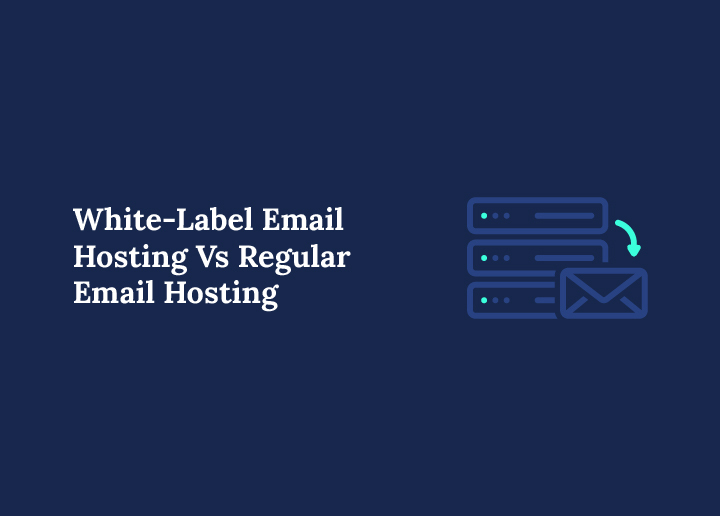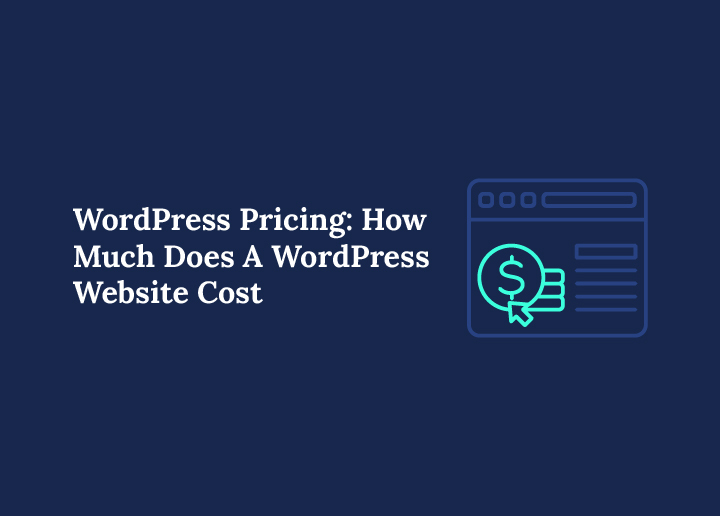Email might not sound flashy in 2025, but let’s be real, it’s still the backbone of professional communication. Whether you’re running a startup, scaling an agency, or managing client relationships, email hosting plays a bigger role than most people realize. Now, when it comes to email hosting, there are two main routes you can take: regular email hosting or white label email hosting.
At first glance, they may look similar, they both let you manage email accounts, send and receive messages, and keep your inbox in order. But here’s the kicker: the differences lie in control, branding, and flexibility.
In this article, we’ll break it all down for you. We’ll cover what each option means, the unique benefits of white label email hosting, how it stacks up against regular email hosting, and which one might make the most sense for your business.
What is a Regular Email Hosting?
Regular email hosting is the classic model most businesses and individuals are familiar with. In this setup, you rent services from a web hosting provider like Google Workspace, Microsoft 365, or even bundled options from hosting companies.
Your emails are stored, managed, and accessed via the provider’s platform, which handles everything from DNS records to spam filters.
Most regular email hosting plans come with reliable features like inbox storage, security protocols, seamless integration with productivity tools, and strong support teams that protect your data.
You simply connect your own domain to the service, update the domain settings, and you’re good to go.
Pros:
- Affordable: A perfect choice for individuals, startups, or small businesses who don’t need advanced features.
- Easy setup: The entire process is quick and requires little technical know-how, the provider’s support team guides you through domain and verification steps.
- Trusted ecosystem: You benefit from industry-leading tools and apps, like chat, document collaboration, and webmail access, all in one place.
Cons:
- Limited branding: While you use your own domain, clients often see heavy Google or Microsoft branding, which doesn’t always align with brand consistency.
- Scalability costs: As your sales team grows and more accounts are added, costs can increase quickly, especially if you’re managing multiple domains.
- Ecosystem lock–in: You’re tied to the provider’s tools, which can limit flexibility if you want to customize features for different clients or optimize performance for eCommerce platforms.
Regular email hosting is great if you want a reliable, protected service without needing to think about infrastructure.
But for businesses like marketing agencies or resellers who want to turn email into a branded service or even a recurring revenue stream, this is where white label options shine.
What is White Label Email Hosting?
White label email hosting is a game changer for agencies, resellers, and businesses looking to go beyond standard solutions.

Instead of reselling Gmail or Microsoft licenses, you get a white label solution that allows you to provide branded email services under your own domain, with your primary color, logo, and even a customized admin panel or support portal.
Behind the scenes, a backend email service provider manages servers, dedicated IP addresses, security, and uptime, while you control the branding, pricing, and customer experience.
Here’s how it works:
- The provider manages infrastructure (servers, DNS records, uptime guarantees, sender reputation).
- You add your branding, custom login pages, webmail portals, tracking links with your own domain, and support team responses.
- You can then resell this as your own branded email services to different clients with competitive pricing.
Most white label email services also come with advanced features like multi-tenant management (ideal for agencies handling multiple domains), marketing automation platform integrations, personalized emails, and reporting dashboards to track delivery rates and email campaigns.
Pros:
- Brand building: Every email link, login page, and webmail interface reflects your brand consistency. This strengthens credibility, especially for marketing agencies.
- Recurring revenue: With a reseller account, you decide how to package and price the service, turning email into a new income stream.
- Customization: From primary color and logo to customize settings for eCommerce platforms or sales teams, you control the entire process.
- Seamless integration: Works with tools like CRMs, marketing automation platforms, and even chat or app-based workflows.
Cons:
- Client responsibility: Since you’re offering this as your own, your support team will be the first point of contact for different clients (though backend providers often help troubleshoot).
- Slightly more setup: You’ll need to manage DNS records, verification, and sometimes dedicated IP addresses to maintain a strong sender reputation and optimize performance.
For businesses managing multiple clients, eCommerce, or frequent email campaigns, a white label email marketing setup can be transformative.
It gives you brand consistency, seamless integration with marketing workflows, and total control, all without needing to build servers from scratch.
Learn More: AI Email Automation
Key Differences Between Regular and White Label Email Hosting
Let’s explore the key differences between these two email hosting:
Branding
Branding is where the first big difference comes in. How your emails appear to clients and end-users directly impacts brand consistency and professionalism.
With regular email hosting, the branding of the web hosting provider (like Google or Microsoft) dominates.
Whether you’re sending business proposals, personalized emails, or sharing tracking links, your clients will see that the service is powered by Gmail or Outlook. While this builds trust in terms of reliability, it does very little to strengthen your own brand identity.
In contrast, white label email hosting is a complete white label solution. You can fully customize the platform with your own domain, logo, primary color, and even your own support team portal.
From the login page to the webmail dashboard, everything reflects your business instead of the backend provider. For marketing agencies, eCommerce platforms, or resellers, this creates a seamless and professional client experience that feels like an in-house solution.
Control and Customization
Control and flexibility often decide which hosting model fits best. Businesses today need tools that can customize, optimize performance, and scale as per demand.

With regular email services, you’re locked into the features, storage limits, and pricing set by the provider.
That means limited options for domain settings, DNS records, or IP addresses. While this is fine for individuals or small businesses, it doesn’t offer much room for tailoring solutions to different clients or for advanced needs like marketing automation platforms.
On the other hand, white label email services provide you with an admin panel where you can manage the entire process, from setting up multiple domains to allocating storage, creating reseller accounts, and even assigning dedicated IP addresses for better sender reputation.
You can also design email campaigns, add tracking links, and offer competitive pricing that works for your business model. This makes it a true game changer for agencies looking for flexibility and scalability.
Client Relationship
Who owns the client relationship is another key factor. This determines who clients trust, contact, and credit for the service they receive.
With regular email hosting, the relationship is direct between the client and the provider. The client pays Google Workspace, Microsoft 365, or another email service directly, and they rely on that provider’s chat, app, or support team for help. You, as a business, play no role in managing the experience beyond using the service.
In white label email hosting, the dynamic is completely different. You’re the face of the service. Clients come to you for everything, from domain settings to troubleshooting email links or verification issues.
This allows you to strengthen loyalty, create upsell opportunities (like bundling branded email services with eCommerce website packages), and position yourself as their go-to expert for professional communication tools.
Scalability
Scalability is about how well each option grows with your business or client base. This is where white label hosting often shines.
With regular email hosting, you typically pay per user or per account. As your sales team grows or you onboard more different clients, costs can quickly rise. For large eCommerce platforms or agencies managing multiple brands, this model can become expensive and harder to optimize.
By contrast, white label email hosting is built for scalability. You can manage multiple domains, clients, and users under one reseller account, often with bulk pricing that keeps costs lower.
Instead of paying for each new inbox individually, you distribute resources across your clients while maintaining full control through a central admin panel. This makes it easier to scale without breaking the bank, while also generating recurring revenue.
Revenue Model
Revenue opportunities vary greatly between the two approaches, and this is one of the biggest incentives for agencies and resellers.

With regular email hosting, there’s no revenue opportunity. You’re simply paying for the service and using it. There’s no way to monetize the email campaigns, tools, or webmail access you or your team rely on.
In white label email marketing and hosting, however, you can create packages, add value, and resell the service at your own competitive pricing. For example, you might include branded email services with a website development package, or upsell advanced features like dedicated IP addresses and advanced analytics for email campaigns.
This transforms email from a cost center into a recurring revenue stream that grows with each new client.
Support and Responsibility
Support responsibilities determine how much effort you or your team will put into maintaining the service.
With regular email hosting, the provider handles everything. From spam filtering and DNS records to uptime monitoring, the support team at Google or Microsoft takes care of technical issues. As a user, your responsibility ends at logging in and using the service.
However, with white label email hosting, you take on the role of first-line support. While the backend web hosting provider manages the infrastructure, including servers, IP addresses, and delivery rates, your clients reach out to you directly for help.
This requires more effort but also builds stronger trust and control over the entire process.
By setting up a professional support team, offering fast responses via chat or app, and ensuring seamless integration with eCommerce platforms, you can turn support into another opportunity to show value and protect your sender reputation.
Expand Your Agency’s Capabilities with White-Label Services!
From web design to development and SEO, we deliver the work while you keep the credit.
Who Should Use Regular Email Hosting?
Regular email hosting is best suited for individuals, freelancers, and smaller businesses that don’t need a lot of extra bells and whistles.
If you’re just starting out and your team is small, say, fewer than 10 people, this option offers simplicity and affordability. You get a professional email setup without having to worry about managing the backend infrastructure.
This model works best for companies that value convenience over customization.
For example, if your team already relies heavily on tools like Google Workspace or Microsoft 365, sticking with regular email hosting feels natural.
These platforms offer seamless integration with calendars, cloud storage, and collaboration apps, making them a perfect fit for teams focused more on productivity than on branding.
Imagine a small five-person startup building its first product. Instead of dealing with servers or branding email services, they choose Google Workspace.
It allows them to focus on growing their business while still enjoying a reliable, secure, and professional email system. In this case, regular email hosting saves time and effort while keeping costs predictable.
Best for: Small teams, startups, or freelancers who want professional email without needing extra management or branding control.
Who Should Use White Label Email Hosting?
White label email hosting, on the other hand, is tailored for agencies, Managed Service Providers (MSPs), IT resellers, and consultants who want to add value to their service offerings.
It allows you to offer professional email services under your own brand, without your clients ever seeing the backend provider’s name. This gives you total control over pricing, customization, and client relationships.
It works especially well for mid-to-large enterprises or digital agencies looking to create recurring revenue streams. For instance, a web design agency can include email hosting in their client care package.
Instead of directing clients to Google or Microsoft, the agency provides email accounts under their own brand, strengthening trust and brand loyalty.
The biggest advantage here is long-term retention. When clients rely on you not just for their website, but also for their daily communication tools, it makes switching providers much harder. That translates into deeper client relationships and more predictable income.
Best for: Agencies and enterprises focused on building client loyalty, reselling services, and creating long-term recurring revenue under their own brand.
The Future of Email Hosting: Why White Label is Growing
Email is far from outdated, in fact, it remains the most trusted and widely used channel for professional communication in 2025. But what’s changing is how businesses want to manage and present their email services.
Increasingly, companies are moving away from cookie-cutter, provider-branded solutions and shifting toward white label email hosting.

One of the biggest trends we’re seeing is the demand for branded experiences. Customers don’t just want email addresses that work, they want them to feel like an extension of the company they’re working with.
When a client logs into their email portal or receives support, seeing your brand front and center builds trust, loyalty, and consistency across the entire customer journey.
Another major factor is the rise of “one-stop” digital service providers. Agencies and managed service providers (MSPs) aren’t just offering web design or IT support anymore, they’re packaging everything, from websites to hosting to email, under one roof.
This full-service approach makes things simpler for clients and strengthens the agency-client bond. White label email hosting fits perfectly into this model, allowing agencies to deliver seamless services without relying on third-party branding.
Lastly, competition is heating up across every industry. To stay ahead, agencies need ways to differentiate and add recurring revenue streams.
White label email hosting does both: it turns what was once a cost into an income-generating service and positions you as a true partner rather than just a vendor. That’s why adoption of white label solutions is rapidly growing, and all signs point to this trend continuing in the coming years.
Read Here: Future of WordPress in Next 10 Years
Conclusion
When it comes to email hosting, there isn’t a one-size-fits-all solution. Regular email hosting works wonderfully for individuals, freelancers, and small teams who want something simple, affordable, and integrated with tools they already use, like Google Workspace or Microsoft 365. If branding and revenue opportunities aren’t priorities, this option keeps things straightforward.
On the other hand, white label email hosting is a game-changer for agencies, IT resellers, and businesses looking to scale. It allows you to offer a professional, fully branded solution, control pricing and packages, and build stronger long-term relationships with clients, all while creating a steady stream of recurring revenue.
The future of email hosting is clearly shifting toward white label, driven by client expectations, competitive markets, and the growing demand for “all-in-one” digital service providers.
FAQs About White Label Email Hosting
Who should use white label email hosting?
White label email hosting is ideal for digital agencies, MSPs, web hosting providers, and IT consultants who want to expand their services. If you’re already offering web design, hosting, or marketing, adding branded email is a natural next step.
It not only helps you generate recurring income but also makes you a one-stop solution for clients. On the other hand, freelancers or small businesses with no resale plans may find standard hosting more suitable.
What are the benefits of offering white label email hosting to clients?
There are several advantages:
- Scalability: You can easily add email hosting to your existing packages, creating bundled solutions that are more attractive.
- Recurring revenue: Turn email hosting into a long-term income stream.
- Stronger branding: Every interaction reinforces your company’s name, not someone else’s.
- Customer loyalty: Clients are less likely to switch when they’re tied into your ecosystem of services.
How is white label email hosting different from regular email hosting?
The biggest difference is branding and ownership. With regular email hosting, the provider’s name (like Google Workspace or Microsoft 365) is front and center. With white label email hosting, your brand takes the spotlight.
You control pricing, support, and customer experience, which allows you to build loyalty and revenue. Regular hosting is great for personal or small business use, but white label is designed for agencies and resellers who want to grow.
What is white label email hosting?
White label email hosting is a service that allows agencies, IT providers, and resellers to offer email hosting under their own brand name.
Instead of showing the provider’s branding, everything from the login portal to customer support can be customized with your logo, colors, and domain. This way, clients feel they are getting email directly from you, while the technical side is handled by a trusted hosting provider in the background.



